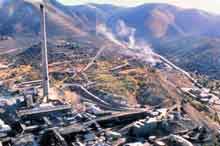No products in the cart.
The Underground Forest

How the Coeur d’Alene Mountains Were Replanted
By Mike Blackbird
Approaching from the west on Interstate 90 at the outskirts of my northern Idaho hometown, a billboard proclaims:
You are now near KELLOGG
The Town which was Discovered
By a JACKASS—
And which is inhabited
By its Descendants.
Local legend claims that an old prospector, Noah Kellogg, was camped up Milo Creek in 1885. He awoke one morning to find that his jackass had slipped its hobble during the night and climbed up the mountainside. Kellogg spent all morning trying to catch his jackass, only to watch it scramble out of his reach each time he approached it. Finally, out of frustration, the old prospector threw a rock, hitting the jackass in the flank. Startled, it kicked out its hind legs, knocking the cap off an outcropping to expose a vein of lead and silver, which would prove to be seventy feet wide and half a mile long [for a slightly different version of this tale, see “Kellogg—Spotlight City,” by Erin Stuber, IDAHO magazine, May 2004].
Most likely, the story is apocryphal, but Noah Kellogg did discover the biggest lead and silver mine in the world. It wasn’t long before other rich mines were discovered in the mountains around the Silver Valley. Between 1885 and 1979, the mines produced 907 million ounces of silver—almost five times that produced by the legendary Comstock Lode in Nevada.
This content is available for purchase. Please select from available options.
Purchase Only
Purchase Only


Comments are closed.